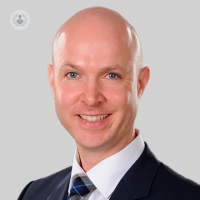Ask a paediatric ENT: how is my toddler's hearing tested?
Written in association with:When it comes to treating hearing loss in young children, intervention should happen as early as possible. If your doctor suspects symptoms of the condition, they can arrange for your child to have a visual reinforced audiometry test with a specialist. The test is suitable for infants from the ages of six months to two years old.
Here, leading ENT surgeon Professor Owen Judd explains what happens during one of these tests and whether it is possible to grow out of hearing loss.

What happens during a hearing test in toddlers?
A hearing test is generally performed by playing sounds of different frequencies and volumes to the subject and recording when and if they are heard. In older children and adults this can be done in a sound-proofed booth using headphones and by pressing a button when a sound is heard.
However, in toddlers and young children, this isn’t often possible. Therefore, we tend to make the hearing test into a game.
In babies and very young children, the sound is played into an open room from speakers on either side, instead of wearing headphones. The child is taken as having responded to the sound if they turn their head towards the noise. There is often a reward for responding correctly in the form of a toy or puppet lighting up or moving on top of the speaker. This is known as Visual Reinforcement Audiometry (VRA).
Older toddlers can be tested slightly differently by playing a game. Sound is either played out of speakers on either side of a sound-proofed room or if the child is old enough, through headphones. The child then plays a game, which may involve putting toys in a box only when they hear a sound. This is termed Play Audiometry.
Who performs the tests on children?
These tests are performed by paediatric audiologists, who are university qualified and trained hearing scientists, specially trained to test children. They have great expertise at putting the child, and parents, at ease and getting the most out of the children for testing.
Audiologists also treat children with certain types of hearing losses with devices such as hearing aids and other types of specialist hearing therapy.
Can children ever outgrow hearing loss?
Yes, and no. Congenital hearing loss or total deafness from birth will generally not improve. However, many forms of acquired hearing loss can get better as children grow.
A good example of this is glue ear, where the majority of children grow out of the condition by the age of 10 years old. One of the treatment options for glue ear is actually to watch and wait for a period of months after it is first diagnosed, as the majority of children simply grow out of the condition and so not all will need any treatment.
Read more: does my toddler have a hearing problem?
If you feel like your child is displaying signs of a hearing problem then do not hesitate to visit Professor Judd for a consultation.


